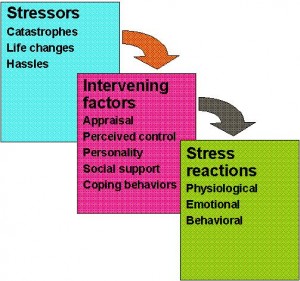
What is stress?
September 16, 2014
Like other clinical psychologists in Winnipeg, I find that stress contributes to many psychological disorders, sometimes as a primary cause and sometimes as a factor that aggravates existing conditions. Understanding the nature of stress therefore provides insights into psychological disorders and their treatment.
Intuitively we feel that we know what stress is because we have all experienced it. Therefore a definition should be simple, but it is not. The literature of the last 100 years offers many different definitions of what stress is whether used by psychologists, physicians, business consultants, or lay people.
Hans Selye, one of the founding fathers of stress research, coined the term stress in 1936 and defined it as “the non-specific response of the body to any demand for change”. He believed that the biochemical effects of stress would be experienced regardless of whether the change was positive or negative.
Today, however, stress is generally viewed as a “bad thing”, with a range of harmful biochemical and long-term psychological effects. These effects are rarely observed in positive situations. Based on another definition stress is “a consequence of a threat of potential or actual loss of valued resources”. The assumption is that people strive to develop and gather resources, like money, relationships, skills, or positive psychological states. Psychological stress occurs when there is threat to lose these resources, when there is actual loss of resources, or when you do not gain any new resources after you invest effort.
Another commonly accepted definition of stress (mainly attributed to Richard S Lazarus) is that “stress is a condition or feeling experienced when a person perceives that demands exceed the personal and social resources the individual is able to mobilize.” In short, it is what we feel when we experience loss of control over events. People feel little stress when they have the time, the experience, and resources to handle situations. They feel great stress when they do not see themselves as being able to handle demands put upon them. Stress is therefore a negative experience to some event and depends on our perceptions of situations and our ability to cope with them. This is the primary definition of stress that I and other psychologists use in practice.
The threatening or challenging kinds of events that cause stress are called stressors. Research has focused on three types.
One type of stressor involves catastrophic events such as earthquakes, combat, or floods. During the days of a 1994 earthquake in LA, sudden deaths due to heart attackes increased 5 times. Physical exertion was a factor in only 13% of the deaths, leaving stress as the likely cause for the rest.
A second stressor involves significant life changes such as death of loved one, divorce, loss of job, or promotion. Research has shown that people who were recently widowed, divorced, or fired, are more vulnerable to disease. A Finnish study of 96.000 widowed people showed their risk of death doubled the week following their spouse’s death.
A final less obvious but more common type of stress involves daily Hassles such as rush hour traffic, long lines, or job stress. These everyday annoyances may be the most serious sources of stress and can take their toll on our health. Hypertension (high blood pressure) rates are high among people living in urban ghettos, where there are daily hassles associated with poverty, parenting alone, unemployment, and crime.
Catastrophic events, life changes, and daily hassles are especially stressful when we perceive them as both negative and uncontrolled. Psychological research with rats has shown that if two rats both receive shocks, but one rat can turn a wheel to stop the shocks, the helpless rat becomes more vulnerable to ulcers and less able to fight off disease.
The impact of stressors depends very much on how they are interpreted or appraised. The same event can be perceived as debilitating or as challenging and energize you. Assisting clients with interpreting stressors in helpful ways is one of the roles of a psychologist promoting stress-reduction. When perceived as challenges, stressors can have positive effects. Athletes, entertainers, and leaders thrive when challenged. Even people who overcome a life-threatening disease or came out of a bad marriage, often become stronger people with improved self-esteem.
Here’s one conceptualization of how stressors impact people.



